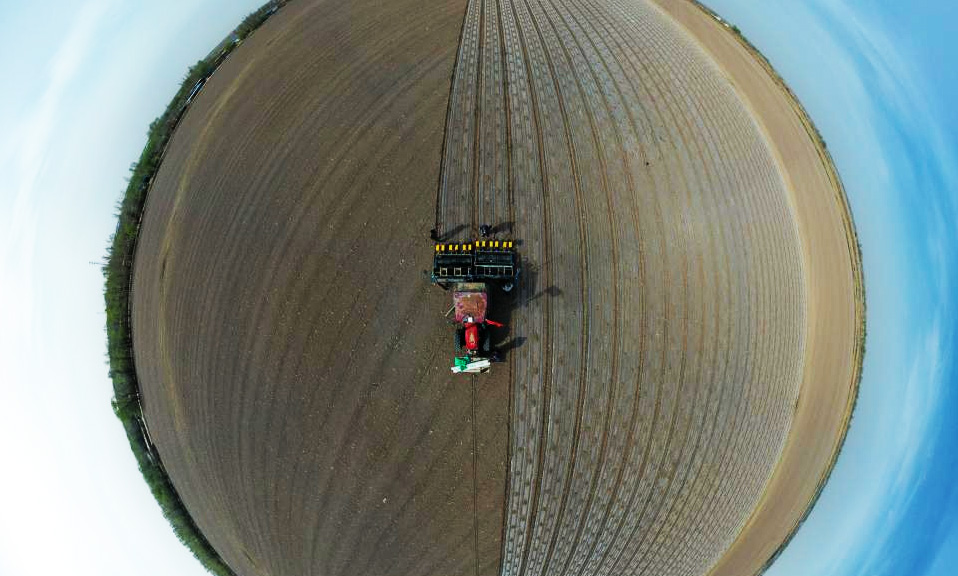Feature: Value of reading recognized despite dislocation, conflict
bdelrahman Fawzi, a 16-year-old refugee student from the Gaza Strip, searches books at a school's library of the United Nations Relief and Works Agency for Palestine Refugees in the Near East (UNRWA) in Amman, Jordan, on April 21. (Xinhua/Ji Ze)
AMMAN/DAMASCUS, April 23 (Xinhua) -- Abdelrahman Fawzi, a 16-year-old refugee student from the Gaza Strip, considered reading as a bridge to acquire knowledge and fulfil his dream of being a doctor and knowledgeable person.
Fawzi likes to spend his leisure time reading at his school's library, which is affiliated with the United Nations Relief and Works Agency for Palestine Refugees in the Near East (UNRWA) office in Jordan, where the agency provides basic education to over 121,000 students at more than 160 schools.
UNRWA teachers, fully aware of the value of reading, increased their efforts to encourage refugee students to read, including organizing cultural and scientific reading competitions.
Reading could improve students' ability in comprehending what they're learning, especially if it's connected to the curriculum, said Ashraf Abu Sbait, a specialist in linguistics and the Arabic language who works as a UNRWA teacher.
"When students' reading is linked to the curriculum, they can save more time. It would also encourage students to consider the educational curriculum as an integral component of their reading habits rather than a separate task," Abu Sbait told Xinhua on the occasion of the World Book Day, which falls on April 23.
Some books tell stories about writers' struggles and ways to overcome difficulties and challenges, which could give students some insights to cope with obstacles, he added.
"Reading encourages refugee children to keep up with other students throughout the world and to co-exist with the current time properly, and reading gives refugee students a greater chance at a brighter future, both academically and professionally," said Abu Sbait, who is also a member of Jordan's language and reading contest judging panels.
Abu Sbait isn't the only one who recognizes the importance of reading. People in Syria were careful to conserve books and ensure that publication and reading would not be hampered by the country's lingering conflict.
In an interview with Xinhua on World Book Day, Eyad Murshed, the director of the Syrian government-run al-Assad library, noted that though many publishing houses and book storage facilities were sabotaged by radical groups, book publishers have managed to survive the war.
Syria's annual book fair has been held for nine sessions during the 11-year-long war, thanks to the perseverance of the country's publishing houses and the Culture Ministry, according to Murshed.
According to him, despite the lack of funding, a shortage of printing resources such as inks, papers, and printers, and the COVID-19 epidemic, which disrupted cultural activities globally, Syria's publishing firms nonetheless managed to print roughly 250 new books each year.
"We recognize the value of reading for community development, and we are looking forward to building a society that can improve itself through culture and books," he noted.
 |
Photos
 World Book Day: Let's read together
World Book Day: Let's read together Rare silver pheasants flock together in greater numbers to forage at Yishan nature reserve in east China's Jiangxi
Rare silver pheasants flock together in greater numbers to forage at Yishan nature reserve in east China's Jiangxi Young artist takes up brush to create lifelike paintings expressing mankind and nature’s harmonious co-existence
Young artist takes up brush to create lifelike paintings expressing mankind and nature’s harmonious co-existence Cutton farming in full swing in China's Xinjiang
Cutton farming in full swing in China's Xinjiang
Related Stories
Copyright © 2022 People's Daily Online. All Rights Reserved.







